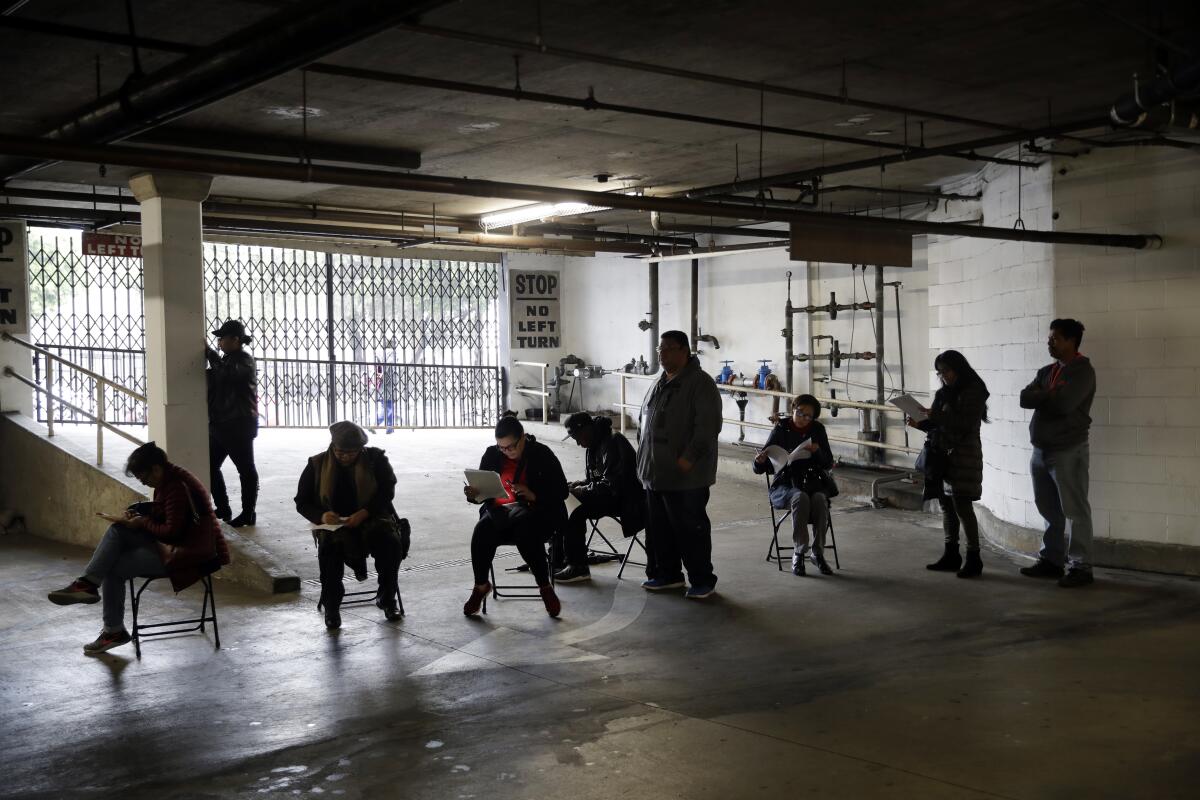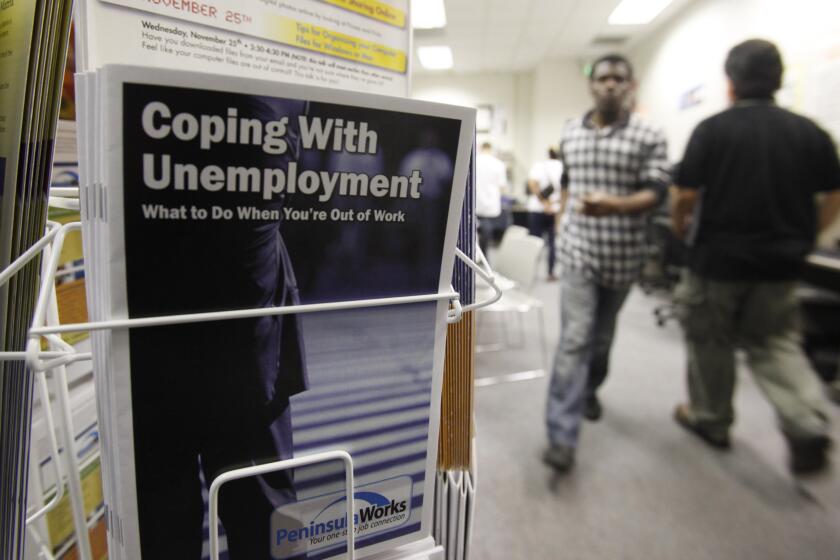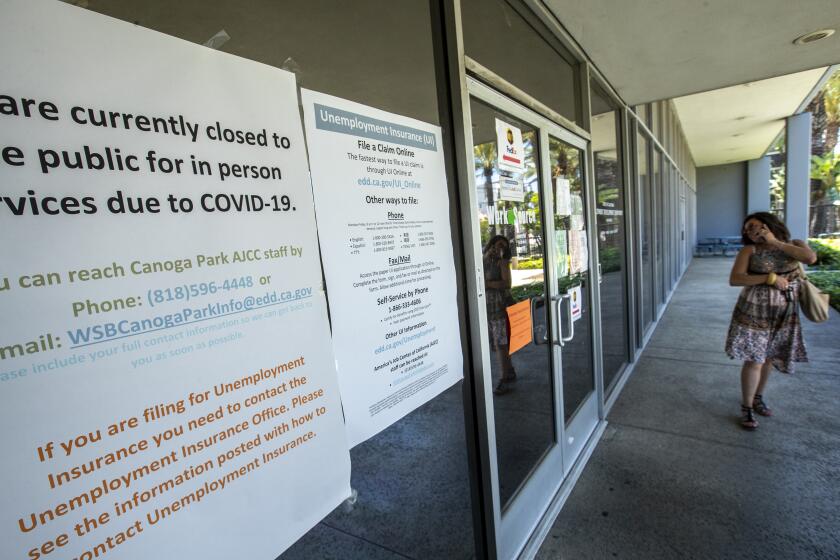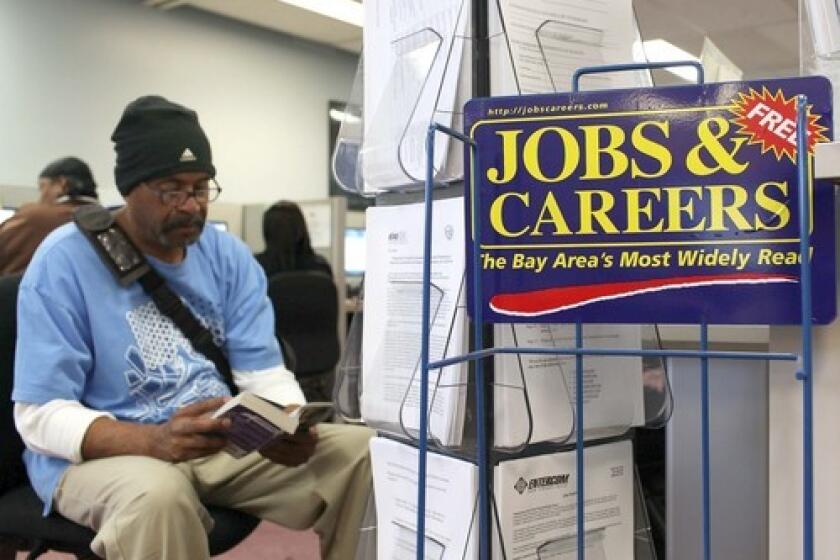Exodus of staff from California’s unemployment agency hinders help for jobless

SACRAMENTO — California’s struggle to get unemployment benefits to jobless workers and combat fraud has been hampered by an exodus of some 1,590 staff and managers involved in the effort since the COVID-19 pandemic began, according to state officials.
The presidential appointment of California Labor Secretary Julie Su to a federal post on Wednesday, subject to confirmation by the U.S. Senate, would be just the latest departure of those in key roles responding to the unprecedented unemployment caused by the pandemic.
Su oversees the state Labor and Workforce Development Agency, which already is missing its second in command, Stewart Knox, who departed as undersecretary in November after 18 months in the job. Knox shared responsibilities with Su and other staff in overseeing the state Employment Development Department among other offices, and more than two months later, Gov. Gavin Newsom has not yet appointed a replacement.
State lawmakers grilled Newsom administration officials on the attrition during a recent legislative hearing on problems at the EDD, which is part of Su’s agency.
Assemblywoman Wendy Carrillo (D-Los Angeles) voiced concern about other management vacancies, including the EDD’s deputy director in charge of its unemployment insurance branch, the EDD’s third in command, who left recently with just three months on the job after replacing someone who had held the post for six months.
“How can we do our jobs when we don’t have the people in place — or people will soon be moving on — to actually fix this problem?” Carrillo asked EDD officials during the legislative hearing.
Californians would be able to get unemployment benefits by direct deposit under legislation introduced to hasten financial aid and cut fraud.
Carrillo, chairwoman of the Assembly Budget Subcommittee on State Administration, added that “a department not having consistent leadership is a challenge during the pandemic. The inconsistency of leadership at EDD has led us to this incredible problem affecting millions of Californians, and a lack of transparency and accountability at the agency.”
The “fluctuation” of staffing has been an issue, acknowledged Rita Saenz, a former director of California government affairs at Xerox Corp. who took over as head of the EDD on Jan. 1, replacing Sharon Hilliard, who retired less than a year after she was appointed by Newsom.
“One of the things that is my experience working in the private sector is that you cannot expect innovation and modernization if your staff comes and goes,” Saenz told lawmakers, “because what happens is people are learning the job, they are doing the job and they don’t have the bandwidth to engage in modernization.”
A state audit this month confirmed that the EDD failed to properly plan and modernize its technology and operations to accommodate a possible future spike in unemployment, a misstep that delayed millions of claims for benefits during the pandemic.
The economic turmoil caused by the pandemic and resulting state stay-at-home orders has led to more than 20 million claims for unemployment assistance since March 2020, and the EDD has paid out $120 billion in jobless benefits.
EDD employees have told lawmakers the workload is overwhelming, leaving them working nights and weekends and feeling stressed to the breaking point. Some talked of not getting enough training, and having to take breaks to cry after fielding calls and hearing desperate stories from Californians thrown out of work.
Throughout the pandemic, unemployed Californians have complained about being unable to get through to the EDD by telephone and months-long delays in having many claims approved.
To handle the increased demand, the EDD has hired 4,878 people since March 2020, said Loree Levy, a spokeswoman for the agency.
Legislators recounted stories of constituents made homeless due to benefit delays; Californians who were the victims of fraud may receive an erroneous tax bill.
However, 1,591 employees have left the EDD during that time, many taking with them significant experience in processing claims.
“Attrition was higher than usual because the EDD made so many limited-term hires to meet immediate needs,” Levy said, adding that new hires are planned to keep up with demand.
Rita Pitsikos, an unemployed San Bernardino-area resident, said that the people she has reached at the EDD call center don’t have the knowledge or training to fix claims.
“They cannot help me,” said Pitsikos, who lost work in sales when the pandemic hit. “They are not trained in dealing with all the issues and they do not have the training in getting claims resolved.”
Lawmakers told Saenz that they are concerned that it takes 13 weeks to fully train new employees to help claimants with problem applications. The director said new tools are being provided to workers so they can help resolve problems by searching keywords in a training manual.
State Auditor Elaine Howle said in her report this month that poor planning and decisions on staffing contributed to widespread delays in approving claims.
“EDD’s failure to promptly process both initial and continued claims was in part the result of its staffing decisions,” the audit said. “Most notably, the strike team reported that EDD assigned its most experienced claims processors to help train newly hired claim-processing staff.”
The lack of staffing at EDD has been so bad that the state Senate dipped into its own budget this month to assign an additional field representative to each of the 40 Senate offices to help unemployed Californians get help with claims that are stuck in the process and who have been unable to find an EDD staffer to help.
California’s unemployment agency was not prepared for the COVID-19 pandemic, an emergency state audit confirmed this week. Many of its issues with processing claims have been ignored for more than a decade.
State Sen. Dave Min (D-Irvine) is among those who have seen a flood of complaints from constituents about a lack of assistance from the EDD.
“The failures here are appalling and we must assure that there are structural reforms so this type of failure never happens again,” Min said during a legislative hearing Feb. 8.
The EDD has also been hit with what it estimates to be more than $11 billion in fraudulent claims. Agency officials acknowledge there have even been “a few” vacancies in its fraud office, leaving just 17 investigators.
One sore spot is the understaffing of EDD call centers. The agency reported last month that it received 4.8 million phone calls from Dec. 20 to Jan. 2, but only 8% of them were answered by staff.
“We have 3,000 people answering 3 to 4 million calls a week,” Saenz told legislators. “That’s not going to work.”
She said the department is putting in more self-serve and call-back functions so claimants don’t have to spend hours on the phone.
EDD Chief Deputy Director Carol Williams told lawmakers that the agency is hiring an additional 900 workers starting this month through April.
“It is anticipation of vacancies and anticipation of the known attrition rate that we have, which is very high, that will keep us at a higher level to respond to claimants,” Williams said.
Sen. Dave Cortese (D-San Jose) told Saenz on Monday that the agency should find many of the 900 additional workers to step up processing claims by transferring staff from other state offices rather than taking potentially months to go through the hiring process.
“I think there is a better way,” Cortese said.
Problems caused by staffing shortages have been exacerbated by the agency’s outdated computer systems.
Many legislators were shocked anew this month when the EDD announced that about 184,000 claims for federal supplemental benefits expired in December and that the agency needs until March 7 to reprogram the EDD computers to allow additional payments.
“Our system needs updating to accept claims from people who had exhausted their eligibility,” Saenz told lawmakers Monday.
Some lawmakers, including Assemblyman Jim Patterson (R-Fresno), said such delays are not acceptable.
”The newest roadblock to getting money for people who need it desperately is the same old problem — dinosaur technology at the EDD,” Patterson said. “They conveniently call it an issue with ‘programming infrastructure,’ but that’s just a fancy way of saying our computers can’t send the money out to people who need it.”
Meanwhile, three Republican members of Congress, including Darrell Issa of California, have asked the chairwoman of the House Oversight and Reform Committee to convene a hearing on the unemployment benefit fraud uncovered in California.
“This egregious mismanagement is a twin betrayal of both taxpayers and our fellow citizens who need and deserve these benefits,” Issa said in a statement.
More to Read
Sign up for Essential California
The most important California stories and recommendations in your inbox every morning.
You may occasionally receive promotional content from the Los Angeles Times.














